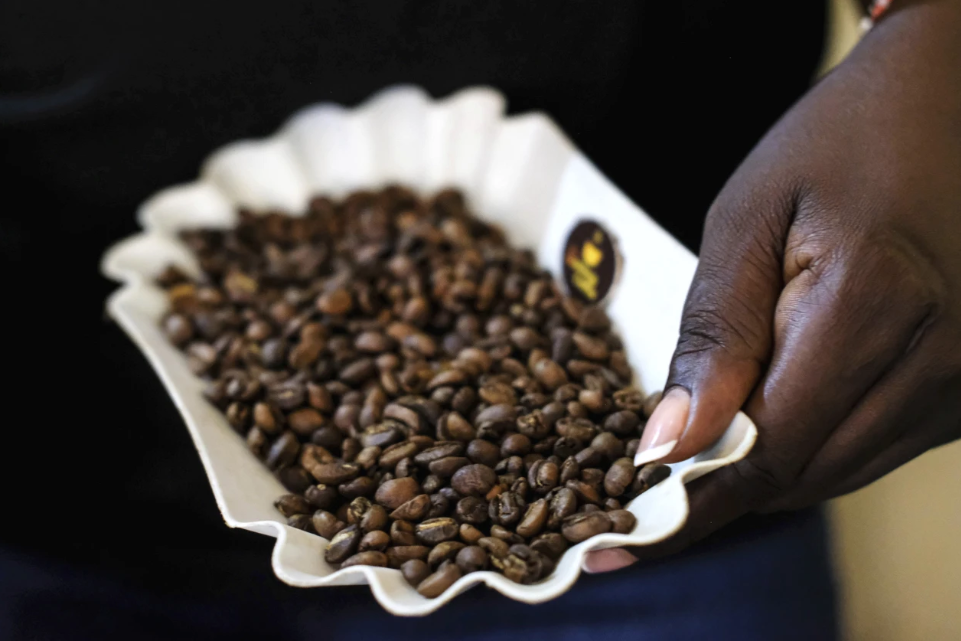Meridah Nandudu, the founder of Bayaaya Specialty Coffee in Uganda, envisioned creating a sisterhood among female coffee growers, and her strategy was simple: offer a higher price per kilogram for beans delivered by women. This approach has been highly effective, with more and more men, who traditionally made the deliveries, allowing their wives to take on the task instead.
Nandudu’s business, which started with just a few women in 2022, now includes over 600 women, making up about 75% of her registered farmers. These farmers work in the mountainous regions of eastern Uganda, which is known for its high-quality arabica coffee beans.
In Uganda, coffee is a significant crop and the country’s leading export, with over 6 million bags of coffee being exported between September 2023 and August 2024, generating $1.3 billion in revenue. Nandudu aims to empower women, who have historically been responsible for the labor of coffee farming but have not benefited equally from the profits. Many women perform the hard work of planting, weeding, and processing the coffee, but when it comes time to sell, the men typically take control of the earnings.
Growing up in the Sironko district near the Kenyan border, Nandudu witnessed the vital role women played in coffee production. She recalls how the harvest season often coincided with a rise in domestic violence, as disputes arose over how much money men brought home from coffee sales. “When men go and sell, they are not accountable,” she said. “Our mothers couldn’t ask where the money went or if it could be used to buy food or pay school fees.”
With a degree in social sciences and her father’s coffee earnings funding her education, Nandudu launched Bayaaya Specialty Coffee in 2018, focusing on the needs of women in Uganda’s conservative society. The name “Bayaaya,” which means “sisterhood” in the local Lumasaba language, reflects her mission to create a strong community of female coffee farmers.
Bayaaya is unique in the city of Mbale, where it operates, because it prioritizes women. In addition to buying and processing coffee for export, it runs initiatives like a cooperative savings society, where members can contribute and borrow funds.
For smallholder farmers in Uganda, every small increase in the price of coffee can make a significant impact. A decade ago, a kilogram of coffee fetched around 8,000 Uganda shillings (about $2), but now the price is closer to $5. Nandudu offers an additional 200 shillings per kilogram when buying from women, a small but meaningful incentive that has encouraged more women to get involved in coffee selling. She also provides a bonus during the off-season, which helps many women manage their finances better.
This initiative has led to a sense of teamwork and empowerment. For example, Linet Gimono, a member of Bayaaya, says she now has a say in how her family spends their coffee earnings. “I can buy soap and sugar without arguing with my husband over it,” she said.
Juliet Kwaga, another member, notes how different things are for her compared to her mother’s generation, where it was unthinkable for women to collect coffee earnings. Now, her husband, with a little encouragement, is comfortable letting her handle the sales, and she is able to contribute to her family’s needs.
In Sironko district, coffee farming is essential to the local economy. Many farmers work on small plots, often just one or two acres, but some have larger tracts. Surprisingly, some farmers, particularly women, have never even tasted the coffee they grow. However, things are slowly changing. Younger women in urban areas, including those working at coffee roasters in Mbale, are developing a new appreciation for coffee.
Phoebe Nabutale, who oversees quality assurance for Darling Coffee, says many of her friends are eager to join the coffee business. For Nandudu, this shift is a sign of progress. “Now, there are more women in coffee as a business,” she said, as she continues her efforts to start exporting coffee beans and further empower women in the industry.













